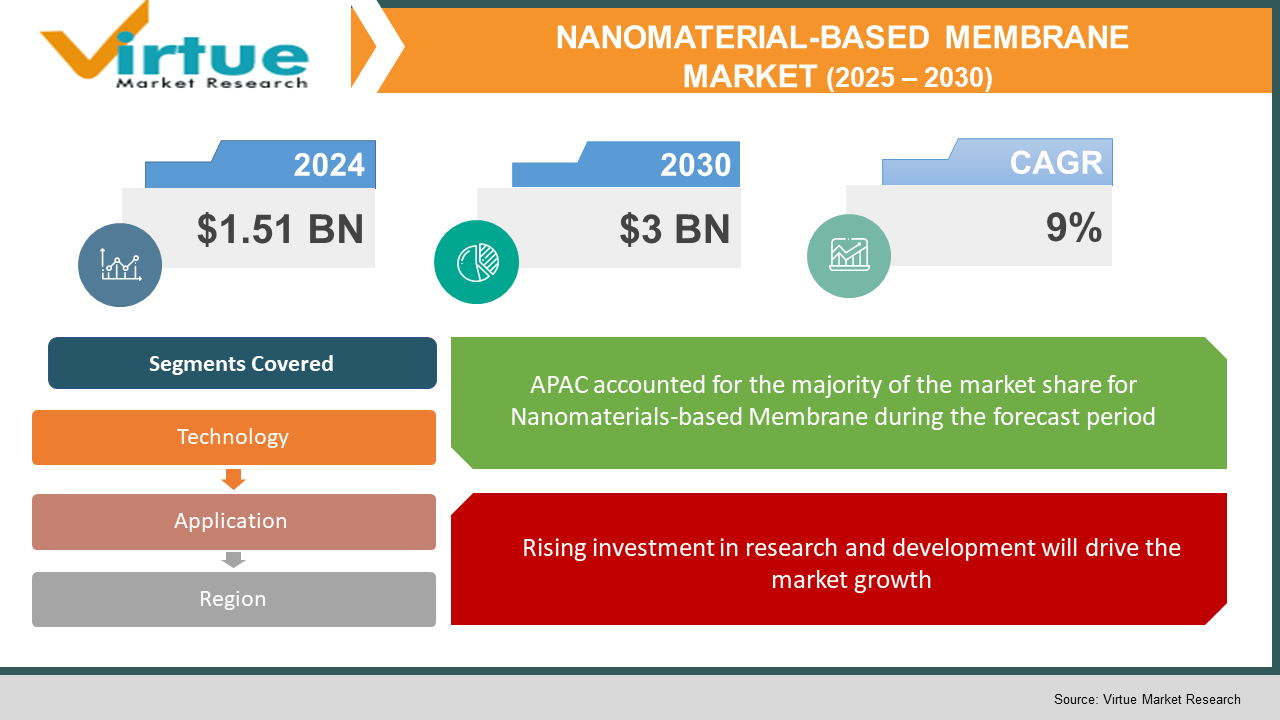Global Nanomaterials-based Membrane Market Size (2023 – 2030)
In 2022, the Global Nanomaterials-based Membrane Market was valued at USD 1.51 billion and is projected to reach a market size of USD 3 billion by 2030. Over the forecast period of 2023-2030, the market is projected to grow at a CAGR of 9%.

Industry Overview
Nanomaterials have emerged as the new high-performance water treatment membrane materials of the future, with the ability to address the global problem of water pollution. Membranes' water permeability, mechanical strength, separation effectiveness, and membrane fouling are all improved by the introduction of nanomaterials. The nanomaterials open up a new route for extremely quick and selective water purification membranes. This review discusses membrane improvements following the addition of a variety of nanomaterials, including nanoparticles (NPs), two-dimensional (2-D) layer materials, nanofibers, nanosheets, and other nanocomposite structural materials. Additionally, the numerous applications of these membranes containing nanomaterials in water treatment are highlighted.
Applications for membrane filter technology include recovering valuable ingredients, cleaning industrial effluents, and producing potable water from the sea. A rising application base is now driving the worldwide membrane technology market, despite the technology's significant uses in the pharmaceutical, biopharmaceutical, and life sciences industries. Population expansion, growing wastewater reuse awareness, and fast industrialization are the main market drivers for membranes. The transition from chemical to physical water treatment, stringent laws governing water treatment and discharge, and changing precipitation dynamics in the environment are other factors driving the membranes market.
Impact of Covid-19 on the industry
COVID-19 negatively impacted the market in 2020. Chemical processing facilities and other industrial settings use membranes for a variety of purposes, such as pressure-driven water and waste treatment, membrane contact operations, such as acid gas absorption, stripping, volatile organic compound removal, and others. The demand for the PVDF membrane reduced as a result of various facilities, including chemical processing units, being temporarily shut down during the lockdown to stem the spread of COVID-19 cases in light of the pandemic scenario. However, due to its low protein binding characteristics and minimal interaction with sample components, nanomaterial membrane is also used for filtration in the pharmaceutical industry, including the clarification and sterilization of protein-containing solutions during drug manufacturing and other applications.
Market Drivers
Rising investment in research and development will drive the market growth
The membrane filter technology is widely utilized for the concentration, purification, and fractionation of macromolecular mixtures in the food and pharmaceutical industries, as well as the manufacturing of portable water and industrial effluent cleaning processes. Additionally, it is useful for separating gases and vapours. The membrane filter technology is anticipated to gain traction over the forecast period, which can be attributed to rising production levels and R&D investments in the pharmaceutical, biopharmaceutical, and life sciences industries. In the pharmaceutical, biopharmaceutical, and life sciences industries, the market is particularly anticipated to witness rising sales in the separation and purification of medication components.
Rising demand for membranes at various stages of drug development will drive the market growth
The need for membrane technology at all stages of drug development, from drug research in laboratories to large-scale pharmaceutical production, is anticipated to stay high and will drive the market throughout the projection period.
Market Restraints
Stringent Government Regulations will challenge the market growth
The pharmaceutical, biopharmaceutical, and life sciences industries will continue to demand membrane technology due to stringent environmental laws, as well as high quality and safety standards, including Good Manufacturing Practices (GMP). As there are now no more effective alternatives on the market, the periodic replacement requirement will continue to support membrane filter sales.
NANOMATERIALS-BASED MEMBRANE MARKET REPORT COVERAGE:
|
REPORT METRIC |
DETAILS |
|
Market Size Available |
2022 - 2030 |
|
Base Year |
2022 |
|
Forecast Period |
2023 - 2030 |
|
CAGR |
9% |
|
Segments Covered |
By technology, application and Geography & region |
|
Various Analyses Covered |
Global, Regional & Country Level Analysis, Segment-Level Analysis, DROC, PESTLE Analysis, Porter’s Five Forces Analysis, Competitive Landscape, Analyst Overview on Investment Opportunities |
|
Regional Scope |
North America, Europe, APAC, Latin America, Middle East & Africa |
|
Key Companies Profiled |
Amniox Medical, Asahi Kasei, Danaher Corporation, Hangzhou Co better Filtration Equipment, Koch Membrane Systems, Mann+Hummel, Merck Group, Sartorius AG, W. L. Gore & Associates, 3M Company |
This research report on the global nanomaterial-based membrane market has been segmented and sub-segmented based on technology, application and Geography & region.
Global Nanomaterials-based Membrane Market- By Technology
- Microfiltration
- Ultrafiltration
- Nanofiltration
- Dialysis
- Gas Filtration
- Others
According to technology, the nanofiltration market is the largest in the world. This is explained by the fact that nanofiltration is possible at lower operating pressures as flow rates increase. Research and development of solvent-stable membranes have increased the usability of nanofiltration in new industries including pharmaceuticals and fine chemicals, fuelling the expansion of the nanofiltration market.
Global Nanomaterials-based Membrane Market- By Application
- Pharmaceutical Filtration
- IV Infusion & Sterile Filtration
- Bio-artificial Processes
- Drug Delivery
- Hemodialysis
- Others
In terms of revenue, the pharmaceutical filtration market had the biggest share by application. The prevalence of renal disorders, improvements in medical technology, the growth of the pharmaceutical and healthcare sectors, and the rise in demand for high-purity materials and medications are all factors contributing to the pharmaceutical filtration market's expansion.
Global Nanomaterials-based Membrane Market- By Geography & Region
- North America
- Europe
- Asia-Pacific
- Latin America
- The Middle East and Africa
The enormous growth potential of the APAC membranes market is fuelled by the rising need for water physical treatment. APAC includes several nations with sizable populations and developing economies, including China, India, Indonesia, Malaysia, Vietnam, and Thailand. Local governments are changing laws related to water treatment, drinking water supply, and wastewater discharge throughout these economies. The shifting reforms to existing water regulations, population growth, rising water treatment investment, and quick industrialization are the main forces driving the APAC membranes market.
Europe is anticipated to experience significant growth throughout the projected period as a result of active support for market expansion from numerous groups, organizations, and associations. However, due to the expanding pharma and biopharma sectors, Asia will have the quickest rate of regional market growth.
Global Nanomaterials-based Membrane Market- By Companies
- Amniox Medical
- Asahi Kasei
- Danaher Corporation
- Hangzhou Co better Filtration Equipment
- Koch Membrane Systems
- Mann+Hummel
- Merck Group
- Sartorius AG
- W. L. Gore & Associates
- 3M Company
NOTABLE HAPPENINGS IN THE GLOBAL NANOMATERIAL-BASED MEMBRANE MARKET IN THE RECENT PAST:
- Merger & Acquisition: - In 2022, Following the U.S. Federal Trade Commission's permission, the life science company Sartorius said today that it has completed the acquisition of the Novasep chromatography division through its subsidiary Sartorius Stedim Biotech.
- Business Expansion: - In 2021, Amniox Medical, Inc. (Amniox), a division of TissueTech, Inc. and a leader in the clinical use of human birth tissue-based products, announced today the start of the first of two multi-center, randomized, controlled Phase 3 clinical trials. Each trial will enroll 220 patients and be conducted at 20 investigational sites across the United States.
- Merger & Acquisition: - In 2019, Ion exchange system producer Eco-Tec Inc. was purchased by Koch Membrane Systems, a developer and manufacturer of membrane filtration technology. With the integration of Eco-Tec, Koch will be able to offer its clients full-scale separation solutions as part of a comprehensive transformation.
Chapter 1.GLOBAL NANOMATERIALS-BASED MEMBRANE MARKET– Scope & Methodology
1.1. Market Segmentation
1.2. Assumptions
1.3. Research Methodology
1.4. Primary Sources
1.5. Secondary Sources
Chapter 2.GLOBAL NANOMATERIALS-BASED MEMBRANE MARKET– Executive Summary
2.1. Market Size & Forecast – (2022 – 2026) ($M/$Bn)
2.2. Key Trends & Insights
2.3. COVID-16 Impact Analysis
2.3.1. Impact during 2022 - 2026
2.3.2. Impact on Supply – Demand
Chapter 3.GLOBAL NANOMATERIALS-BASED MEMBRANE MARKET– Competition Scenario
3.1. Market Share Analysis
3.2. Product Benchmarking
3.3. Competitive Strategy & Development Scenario
3.4. Competitive Pricing Analysis
3.5. Supplier - Distributor Analysis
Chapter 4.GLOBAL NANOMATERIALS-BASED MEMBRANE MARKET- Entry Scenario
4.1. Case Studies – Start-up/Thriving Companies
4.2. Regulatory Scenario - By Region
4.3 Customer Analysis
4.4. Porter's Five Force Model
4.4.1. Bargaining Power of Suppliers
4.4.2. Bargaining Powers of Customers
4.4.3. Threat of New Entrants
4.4.4. Rivalry among Existing Players
4.4.5. Threat of Substitutes
Chapter 5. GLOBAL NANOMATERIALS-BASED MEMBRANE MARKET- Landscape
5.1. Value Chain Analysis – Key Stakeholders Impact Analysis
5.2. Market Drivers
5.3. Market Restraints/Challenges
5.4. Market Opportunities
Chapter 6.GLOBAL NANOMATERIALS-BASED MEMBRANE MARKET– By Technology
6.1. Microfiltration
6.2. Ultrafiltration
6.3. Nanofiltration
6.4. Dialysis
6.5. Gas Filtration
6.6. Others
Chapter 7.GLOBAL NANOMATERIALS-BASED MEMBRANE MARKET– By Application
7.1. Pharmaceutical Filtration
7.2. IV Infusion & Sterile Filtration
7.3. Bio-artificial Processes
7.4. Drug Delivery
7.5. Hemodialysis
7.6. Others
Chapter 8.GLOBAL NANOMATERIALS-BASED MEMBRANE MARKET– By Region
8.1. North America
8.2. Europe
8.3. The Asia Pacific
8.4. Latin America
8.5. The Middle East
8.6. Africa
Chapter 9.GLOBAL NANOMATERIALS-BASED MEMBRANE MARKET– Company Profiles – (Overview, Product Portfolio, Financials, Developments)
9.1. Amniox Medical
9.2. Asahi Kasei
9.3. Danaher Corporation
9.4. Hangzhou Co better Filtration Equipment
9.5. Koch Membrane Systems
9.6. Mann+Hummel
9.7. Merck Group
9.8. Sartorius AG
9.9. W. L. Gore & Associates
9.10. 3M Company
Download Sample
Choose License Type
2500
4250
5250
6900



